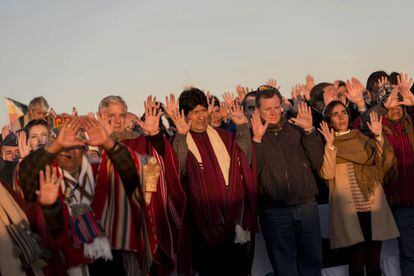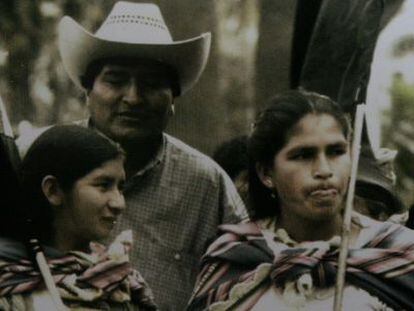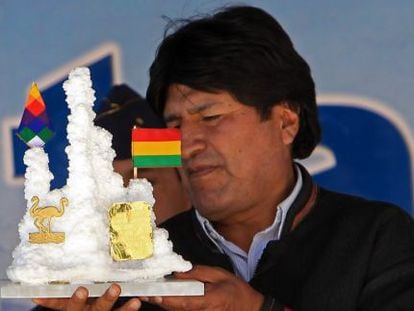Bolivia’s Evo Morales celebrates 10 years in power
The president will be remembered as the country’s first indigenous head of state

Evo Morales is celebrating 10 years in power on Friday. The Bolivian president was elected in 2006 on the promise to “relaunch the country” after voters opted to turn their backs on the “neoliberal” party system. A decade later, Morales has firmly left his mark on Bolivia. In 2009, a new constitution changed the country’s official name from the “Republic of Bolivia” to the “Plurinational State of Bolivia.” Morales has also ushered in a new economic model based on exploiting natural gas resources, widespread prosperity, better relations between ethnic groups, and political stability, as well as an undisputed and indisputable central pillar: Morales himself.
Even if Morales were to step down now, he would still be remembered as the most successful president the country has known
Morales and his Movement for Socialism (MAS) party have now held power longer than any other administration in the country’s history.
His tenure has led to comparisons with Porfirio Díaz, the Mexican president who ruled before the Revolution, and Fidel Castro, the leader who radically changed Cuba. Former President Carlos Mesa says Morales is not only one of the three most important leaders the country has had, but that he has also become a “legend.”
Even after being in power for a period of time that seemed “unimaginable” to Bolivians, he still enjoys a 70% popularity rating. He will be remembered as the country’s first indigenous president in a country with a majority indigenous population, but where intense racism persists and to take part in politics you have to be white and have a university degree.
Even if Morales were to step down right now, he would still be remembered as the most successful president the country has known. “The best president,” as some of his supporters, who hail from all social classes, say.
Regulations that prohibited indigenous women from entering hotels and restaurants in traditional dress have been abolished
MAS speaks of Morales’ tenure as Bolivia’s “golden age.” According to Manuel Canelas, a young MAS deputy, his greatest achievement has been “economic and political stability, which has turned Bolivia into a normal country, with certainties that it didn’t have before and that are basic in other countries.”
Canelas also highlights the “social pact” established in the new constitution, which combines MAS’s revolutionary nationalist and pro-indigenous ideology with the liberalism of the opposition and traditional elites. “We achieved it without major outbreaks of violence and that’s how we brought about social inclusion of indigenous people,” he says. Canelas is not only talking about inclusion in politics, but also in everyday life.
Thanks to the Morales government’s policies, regulations that prohibited indigenous women from entering hotels and restaurants in traditional dress (cholas) have been abolished. “Any one of them might be a minister,” says the owner of one establishment.
Senator Óscar Ortiz, a member of the opposition Democratic Movement, agrees: “The good thing about this government was its call for indigenous inclusion and that it has made the fight against poverty a priority.”
But, the brighter the lights, the darker the shadows. Ortiz says the president “missed out on a huge opportunity for society, the economy and politics.” Given the favorable conditions, especially with the raw materials boom, “he could have integrated [different sectors of] society, but he has divided them and put them at odds with one another. He could have laid down the foundations for growth by productive development, but he favored populism and bet on growth based only on natural gas extraction and large public works instead of expanding and diversifying production. He could have consolidated a democratic state, but he continued with the chavista model and now we have a façade, a democracy devoid of the rule of law.”
Canelas admits that MAS’s dominance “creates tensions in this pluralist political system,” but he attributes these to the weakness of the opposition and the strength of the party, which is now campaigning to win a referendum in February that would allow Morales to change the constitution and run for president for the fourth consecutive time in 2019.
“Morales staying in power is a danger for the president himself,” Ortiz says. In his opinion, if Morales had left the presidency after his first two terms, he would have had a stronger legacy than if he stays, especially in light of the economic crisis after oil prices fell.
English version by Dyane Jean François.












































